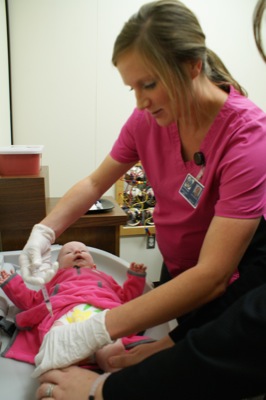Friday, November 20th, 2015
Officials fear pertsussis cases may increase
By Shelley Grieshop

Photo by Shelley Grieshop/The Daily Standard
Registered nurse Lisa Vondrell on Thursday afternoon administers a Dtap vaccine - a combination diphtheria, tetanus and pertussis - to 4-month-old Layla Strombold of Coldwater at the Mercer County-Celina City Health Department. Eleven cases of pertussis have been reported in Mercer County since Oct. 13.
An unwanted guest could be lurking among family and friends at Thanksgiving gatherings.
Local health officials fear an ongoing outbreak of pertussis (whooping cough) could worsen in the coming weeks if people don't heed precautions.
"With the holidays coming up, it's important people stay home if they're sick," local epidemiologist Deb Scheer said.
Mercer County has reported 11 confirmed cases of pertussis since October 13 in 10 children ranging in age from 4 months to 12, and one adult. The number of cases nearly quadruples the county's annual average.
Only two other counties across the state currently are experiencing pertussis outbreaks, according to Ohio Department of Health spokeswoman Melanie Amato.
"Franklin County is investigating seven pertussis outbreaks and Fairfield County is investigating one," she said earlier this week.
So far, those infected in Mercer County have reported mild symptoms with only a few experiencing a fever. None have been hospitalized, Scheer said.
Four of the 11 cases involve people who were not vaccinated for pertussis.
Scheer said those diagnosed with the highly-contagious illness are treated with antibiotics, Scheer said.
"When you start on antibiotics, you should stay isolated for five days," she explained, adding a cough can remain even after a person is no longer contagious.
Pertussis is a serious respiratory infection that most often afflicts children. Symptoms include sneezing, runny nose, low-grade fever and a mild cough. Within two weeks, the cough can become more severe and is characterized by numerous rapid coughs followed by a high-pitched whoop, vomiting during or after the coughing fits and exhaustion.
These episodes may last for several months and are more frequent at night.
"Lots of people have been getting tested," Scheer said, adding results can be unreliable.
Tests taken more than a week after symptoms appear or following antibiotic treatment often come back negative, she said.
Scheer said she's been in contact with area physicians, pharmacies and hospitals to monitor the ongoing outbreak.
The health department also is working with the Wisconsin State Laboratory to confirm which type of bacteria is circulating locally. The strain may be a milder form of pertussis that is not prevented by the vaccine, county director of nursing Julia Shaffer said on Thursday.
"The symptoms and treatment are the same," she added.
Test results likely won't be available until sometime in December, Shaffer said.
Most people are being pro-active by getting tested or verifying they're up to date on their pertussis vaccine, Scheer said.
Kary Strombold of Coldwater on Thursday held onto her 4-month-old daughter, Layla, while the infant received one of the vaccines in a series for diphtheria, tetanus and pertussis.
"I want to keep her protected against everything I possibly can," she said.
Strombold said she works in a local doctor's office and fears her exposure to illnesses such as pertussis could jeopardize her children's health if she doesn't get them immunized.
The combination vaccines are recommended for people of all ages. Dtap is given to children 6 weeks to 7 years old, and Tdap is administered to those 7 years old and older.
Kindergarten students are required to have four to five doses of Dtap before the start of school unless a waiver is signed. All adults who regularly come in contact with infants should receive the Tdap vaccine, Scheer said.
"The most vulnerable in our community are our infants that have not received any pertussis vaccine," Scheer wrote in a report distributed at the county health board meeting this week.
Nearly two dozen cases were confirmed during a pertussis outbreak in Mercer County in 2008. Several infected children developed serious complications and were hospitalized in intensive care, but no deaths were reported.
